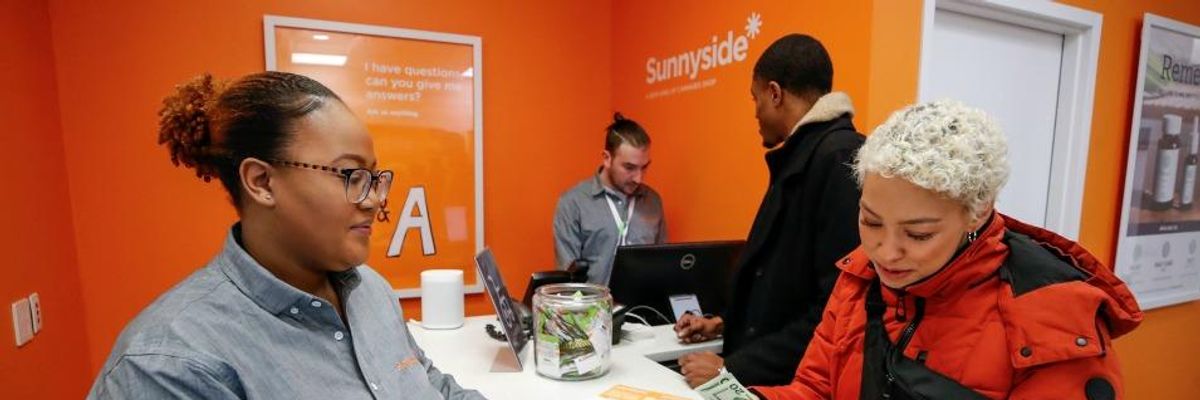Advocates for marijuana legalization on Wednesday urged members of the U.S. Congress to support the MORE Act when it reaches the House floor later this week, after the bill passed in the House Rules Committee.
Groups including the Drug Policy Alliance (DPA) and NORML applauded the advancement of the Marijuana Opportunity, Reinvestment, and Expungement (MORE) Act (H.R. 3884), which, among other things, would remove marijuana from the Federal Controlled Substances Act--forcing the federal government to catch up with a growing number of states that have legalized marijuana for medical and recreational use in recent years.
"The historic nature of today's progress cannot be overstated," said NORML in a statement. "For the first time in American history, the public will see the 'People's House' vote to end the senseless, cruel, and racist policy of marijuana criminalization and prohibition."
The MORE Act will move to the House floor weeks after voters in five states--New Jersey, Arizona, Montana, Mississippi, and South Dakota--voted to legalize the substance, demonstrating the widespread and diverse support for decriminalization.
"This is an issue that has galloped ahead of the politicians. The momentum is building. So if people are going to be on the wrong side of this, there will be a political price that will be paid."
--Rep. Earl Blumenauer (D-Ore.)
Last month, Gallup found that 68% of American adults support marijuana legalization--the highest percentage ever recorded.
DPA has been instrumental in pushing the Democratic-led House to consider the legislation, focusing on the MORE Act's ability to "prevent further injustice" in communities that have been torn apart by the War on Drugs over the past three decades. Black Americans are four times as likely to be arrested for marijuana possession than their white counterparts, despite the fact that people of all races use the substance in roughly equal numbers.
"Marijuana prohibition continues to rob communities of color and low-income people of economic opportunity, security, their freedom, and even their safety," Queen Adesuyi, policy manager for the Office of National Affairs at DPA, said in a statement. "The time to end this decades-long assault and begin building these communities back up is long overdue. And while the MORE Act will not undo their pain, it is the most significant opportunity we have had to date to begin to right these wrongs."
DPA was joined by internationally known artists, musicians, and other advocates in writing to members of the House and calling on them to support the legislation.
"As the U.S. grapples with the aftermath of the murders of George Floyd, Breonna Taylor, Ahmaud Arbery, and countless other Black, Latinx, and Indigenous people harmed by state-sanctioned violence, it is critical that our public policy center racial equity and reparative justice," wrote (pdf) the advocates, including former NBA player Kevin Garnett, media personality Ashlee Marie Preston, and recording artist Ty Dolla $ign. "Furthermore, passage of the bill will also help ameliorate economic hardship caused by Covid-19 as the bill will minimize barriers to employment resulting from prior criminal history."
"We are grateful to have the support of these notable figures, who are using their platform to demand justice for those impacted by marijuana criminalization," said Adesuyi.
In addition to decriminalizing marijuana at the federal level, the MORE Act would require federal courts to expunge many past marijuana convictions and would impose a 5% sales take on marijuana products. The revenue would help fund grant programs that would help people "adversely impacted by the War on Drugs" to obtain work, find re-entry services, and access legal aid.
The legislation would also open up opportunities for entrepreneurs who grow and sell marijuana to access Small Business Administration funds and provide federal protections for people who are denied federal benefits due to prior marijuana-related convictions.
Rep. Earl Blumenauer (D-Ore.), a longtime advocate for marijuana legalization, told Yahoo! Finance that the legislation is "coming at a time when Americans are recognizing how hopelessly flawed the criminal justice system is."
Lawmakers who vote against legislation that's supported by more than two-thirds of Americans do so at their own peril, the congressman added.
"This is an issue that has galloped ahead of the politicians," Blumenauer said. "The momentum is building. So if people are going to be on the wrong side of this, there will be a political price that will be paid."




